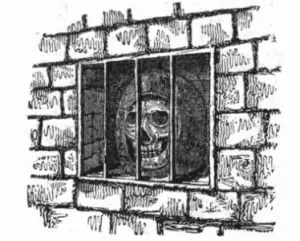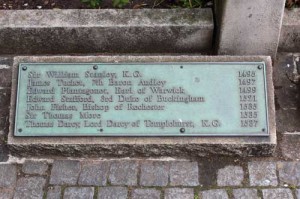 On this day in history, 6th July 1535, Henry VIII’s former friend and Lord Chancellor, Sir Thomas More, was beheaded on Tower Hill as a traitor. He had been found guilty of high treason under the Treason Act of 1534 for denying the King’s supremacy and refusing to take the Oath of Succession.
On this day in history, 6th July 1535, Henry VIII’s former friend and Lord Chancellor, Sir Thomas More, was beheaded on Tower Hill as a traitor. He had been found guilty of high treason under the Treason Act of 1534 for denying the King’s supremacy and refusing to take the Oath of Succession.
Chronicler Charles Wriothesley recorded his death as follows:
“This yeare allso, the first day of Julie, beinge Thursdaye, Sir Thomas More, knight, sometyme Chauncellor of England, was arreigned at Westminster for highe treason and there condemned, and the Tuesday after, beinge the 6th of Julie, he was beheaded at the Tower Hill, and his bodie was buried within the chappell in the Tower of London, and his head was sett on London Bridge. The effect of his death was for the same causse that the Bishopp of Rochester died for.”
Chronicler Edward Hall wrote:
“Also the vi. day of Julye was sir Thomas More beheaded for the like treason before rehersed, which as you haue heard was for the deniyng of the kynges Maiesties supremitie. This manne was also coumpted learned, & as you haue heard before he was lorde Chauncelor of England, and in that tyme a great persecutor of suche as detested the supremacy of the bishop of Rome, whiche he himselfe so highly fauored that he stoode to it till he was brought to the Skaffolde on the Tower hill where on a blocke his head was striken from his shoulders and had no more harme.
I cannot tell whether I should call him a foolishe wyseman, or a wysefoolishman, for vndoubtedly he beside his learnyng, had a great witte, but it was so mingled with tauntyng and mockyng, that it semed to them that best knew him, that he thought nothing to be wel spoken except he had ministered some mocke in the communcacion insomuche as at is commyng to the Tower, one of the officers demanded his vpper garment for his fee, meanyng his goune, and he answered, he should haue it, and tooke him his cappe, saiyng ii was the vppermoste garment that he had. Lyke-wise, euen goyng to his death at the Tower gate, a poore woman called vnto him and besought him to declare that he had certain euidences of hers in the tyme that he was in office (which after he was appreheded she could not come by) and that he would intreate she might haue themagayn, or els she was vndone. He answered, good woman haue pacience a litle while, for the kyng is so good vnto me that euen within this halfe houre he will discharge me of all busynesses, and helpe thee himselfe. Also when he went vp the stayer on the Skaffolde, he desired one of the Shiriffes officers to geue him his hand to helpe him vp, and sayd, when I come doune againe, let me shift for my selfe aswell as I can. Also the hangman kneled doune to him askyng him forgiuenes of his death (as the maner is) to whom he sayd I forgeue thee, but I promise thee that thou shalt neuer haue honestie of the strykyng of my head, my necke is so short. Also euen when he shuld lay doune his head on the blocke, he hauyng a great gray beard, striked out his beard and sayd to the hangman, I pray you let me lay my beard ouer the blocke least ye should cut it, thus with a mocke he ended his life.”
A document in Letters and Papers gives the following information about More after his trial and about his execution:
“On his way to the Tower one of his daughters, named Margaret, pushed through the archers and guards, and held him in her embrace some time without being able to speak. Afterwards More, asking leave of the archers, bade her have patience, for it was God’s will, and she had long known the secret of his heart. After going 10 or 12 steps she returned and embraced him again, to which he said nothing, except to bid her pray to God for his soul; and this without tears or change of colour. On the Tuesday following he was beheaded in the open space in front of the Tower. A little before his death he asked those present to pray to God for him and he would do the same for them [in the other world.] He then besought them earnestly to pray to God to give the King good counsel, protesting that he died his faithful servant, but God’s first.
Such was the miserable end of More, who was formerly in great reputation, and much loved by the King, his master, and regarded by all as a good man, even to his death.”

As Wriothesley says, his body was buried at the Chapel of St Peter ad Vincula, at the Tower of London, and his head put on a spike on London Bridge. Heads would eventually be thrown into the River Thames but More’s wasn’t. E E Reynolds, in the book Margaret Roper: Eldest Daughter of St Thomas More, quotes Thomas Stapleton, an early biographer of Thomas More:
“[The head] by order of the king, was placed upon a stake on London Bridge, where it remained for nearly a month, until it had to be taken down to make room for other heads … The head would have been thrown into the river had not Margaret Roper, who had been watching carefully and waiting for the opportunity, bribed the executioner, whose office it was to remove the heads, and obtained possession of the sacred relic. There was no possibility of mistake, for she, with the help of others, had kept careful watch, and, moreover, there were signs so certain that anyone who had known him in life would have been able now to identify the head.”
Reynolds then explains:
“After the death of Margaret Roper, the head was in the keeping of her eldest daughter, Elizabeth, Lady Bray, and it was probably at her death in 1558 that it was placed in the Roper vault under the Chapel of St. Nicholas in St. Dunstan’s, Canterbury.
It was seen there in 1835 when, by accident, the roof of the vault was broken; the head was enclosed in a leaden case with one side open; this stood in a niche protected by an iron grille. The vault was later sealed, but a tablet in the floor above bears the inscription:
Beneath this floor is the vault of the Roper family in which is interred the head of Sir Thomas More of illustrious memory, sometime Lord Chancellor of England, beheaded on Tower hill 6th July 1535. Ecclesia Anglicana libera sit.”
In an article “The scull [sic] of Sir Thomas More”, in The Gentleman’s Magazine of May 1837, there is the following quote about More’s head being seen in the vault in the 18th century, along with the drawing of the skull which you see at the top of this article: “Dr. [then Mr.] Rawlinson informed Hearne, that when the vault was opened in 1715, to enter into one of the Roper’s family, the box was seen enclosed in an iron grate.”
It must still be there.
Notes and Sources
- Wriothesley, Charles (1875) A chronicle of England during the reigns of the Tudors, from A.D. 1485 to 1559 Volume 1, Camden Society, p. 29.
- Hall, Edward (1809) Hall’s chronicle : containing the history of England, during the reign of Henry the Fourth, and the succeeding monarchs, to the end of the reign of Henry the Eighth, in which are particularly described the manners and customs of those periods. Carefully collated with the editions of 1548 and 1550, J Johnson, p. 817-818.
- Letters and Papers, Foreign and Domestic, Henry VIII, Volume 8, January-July 1535, 987, Sir Thos. More to Antony Bonvyse.
- Reynolds, E. E. (1960) Margaret Roper: Eldest Daughter of St Thomas More, P J Kennedy and Sons, p. 110-111.
- The Gentleman’s Magazine, ser. 2, v. 7, 1837, p 497 – see https://babel.hathitrust.org/cgi/pt?id=pst.000068790486;view=1up;seq=521
